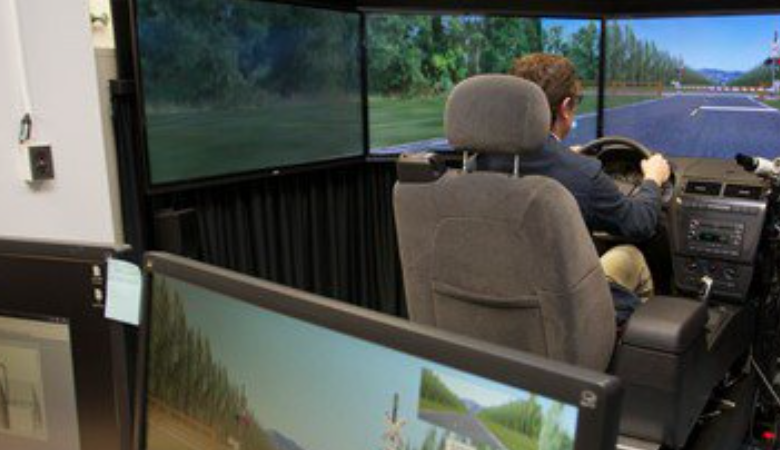Transportation Human Factors

About Us
The U.S. DOT Volpe Center’s Transportation Human Factors team provides internationally recognized human factors research, engineering, development, and evaluation capabilities within a human systems integration framework.
We pioneer new research focused on the relationships between humans and policies, processes, automation, and technologies to improve transportation safety, security, and productivity with due concern for unintended consequences.
Our team specializes in analyzing operator performance capabilities and behavior under normal, abnormal, and emergency conditions. We identify, develop, and apply scientific knowledge of human capability, judgment, and decision-making and human performance, needs, and motivations to complex transportation systems. This allows us to inform design and formulate policy and create safer, more accessible, and more efficient transportation for people.
We work with U.S. DOT and its modal agencies, along with other public- and private-sector transportation organizations, to advance a transportation system centered on the needs and capabilities of the people who use, operate, or are impacted by those systems.
Our human factors laboratories house simulators and other technologies to support human performance studies and improve transportation safety, security, and productivity with due concern for unintended consequences. Features:
- Human-in-the-loop and part-task simulation, including augmented reality (AR)/virtual reality (VR)
- Meeting emergent transportation research needs across modes, including maximizing safety benefits of technology
- Includes NHTSA's Alcohol Countermeasures Lab, which performs evaluations of evidential breath test instruments and alcohol screening devices and provides expert services to reduce the levels of intoxicated driving on our nation’s roads
See the U.S. DOT Volpe Center Human Factors Lab in action.
Some highlights of our work include:
- Supporting FAA’s Data Communications (Data Comm) program to add digital, text-based communications for air traffic controllers and pilots to help make air travel safer and more efficient
- Supporting NHTSA’s Alcohol Countermeasures Program to further reduce the rate of intoxicated driving through the development and evaluation of measurement techniques for alcohol on the breath, development of performance guidelines for breath measurement devices, testing of instruments intended for police use, and technical support of demonstration and research programs
- Working with FRA to develop the Rail Suicide Prevention Program to provide the public, FRA, rail carriers, and suicide prevention researchers with a comprehensive view of why rail suicides happen in the U.S., where and when they are most likely to occur, and how to prevent them
The U.S. DOT Volpe Center’s extensive research in transportation human factors dates back to our founding in 1970. For a comprehensive resource, we host and maintain our Human Factor Research Publications and Papers bibliography. These comprehensive resources allow transportation organizations to better understand operator and user behavior, to further understand user needs and requirements, and then ensure those needs are factored into transportation system design, construction, repair, and improvement.
Our Capabilities
Human Factors Research and Design
- Pioneering new relationships between humans and systems, including policies, processes, automation, and technologies, to improve transportation safety, security, and productivity, with due concern for unintended consequences
- Conducting and assessing human-machine interaction research to improve transportation system design and operation
- Evaluating and designing human-centered automation evaluation and design
- Evaluating operator impairment evaluation (e.g., fatigue, drugs, alcohol, and distraction)
- Assessing human error and developing countermeasures
Safety and Security Assessments
- Conducting assessments of safety programs across all modes
- Developing methods and models to measure the effectiveness of safety initiatives
- Leveraging Safety Management System principles and methodology to improve safety culture and safety reporting
Applied Data Science
- Using advanced data, image analysis, and visualization tools and methods, to help solve transportation challenges
- Leveraging experimental design, automation human factors, and statistical analysis
User Experience/Usability Research
- Applying usability principles to design safe and effective transportation displays and user interfaces
- Conducting user research to identify and address usability issues that impact transportation operator tasks
Meet Our Team
View selected staff biographies.
 Tracy Lennertz, PhD
Tracy Lennertz, PhD
Co-Chief
U.S. DOT Volpe Center
220 Binney Street
Cambridge, MA 02142
United States
Email:
tracy.lennertz@dot.gov
Phone: 617-494-2945
Tracy Lennertz, PhD is co-chief of the U.S. DOT Volpe Center’s Transportation Human Factors Division, within the Safety Management and Human Factors Technical Center. She has been as the U.S. DOT Volpe Center since 2010, leading and conducting applied human factors research in transportation, including a multi-year portfolio examining the complexities of pilot-controller communications.
Lennertz serves as a subject-matter expert for the Operational Data Link Working Group at the International Civil Aviation Organization, and she has been instrumental in shaping global guidance for pilot-controller communications. She has more than 40 publications, spanning topics in human factors and research in experimental psychology.
Lennertz received her PhD in Psychology from Northeastern University (Boston, MA), her master’s degree from Florida Atlantic University (Boca Raton, FL), and her undergraduate degree from the University of Toronto (Mississauga, ON). She co-leads a multi-disciplinary team of human factors researchers—with a focus on improving transportation safety across modes, especially in aviation, automobiles, and trucks.
Lennertz also facilitates a center-wide monthly roundtable discussion on innovation for U.S. DOT Volpe Center staff that aims to engage vibrant community that builds U.S. DOT Volpe Center’s innovation culture and informs strategic decision-making as how to implement innovation at the U.S. DOT Volpe Center.
View Tracy Lennertz's LinkedIn profile.
 David Moore
David Moore
Co-Chief
U.S. DOT Volpe Center
220 Binney Street
Cambridge, MA 02142
United States
Email:
david.moore@dot.gov
Phone: 617-494-2235
David Moore is co-chief of the U.S. DOT Volpe Center's Transportation Human Factors Division, within the Safety Management and Human Factors Technical Center. He has been at the U.S. DOT Volpe Center since 2009, working with scientists, analysts, policymakers, planners, and engineers conducting transportation safety research and managing safety programs.
Moore has served as the chief of the Transportation Human Factors Division since June of 2014. In this role, he co-leads a multi-disciplinary team of human factors researchers—with a focus on improving transportation safety across modes, especially in rail and transit. Moore is the executive agent of the U.S. DOT Human Factors Coordination Working Group, facilitating collaboration among human factors researchers across the Department and other federal agencies. He is a member of the National Academies of Science, Transportation Research Board (TRB) Standing Committee on Human Factors of Vehicles (ACH 30), a position held since 2016, and a member of the American Evaluation Association and Human Factors and Ergonomics Society.
From 2009 to 2014, Moore served as a management and program analyst coordinating U.S. DOT Volpe Center’s support of a federal regulatory agency’s redesign of their enforcement prioritization and compliance assistance programs. From 2006 to 2009, he worked for Chenega Advanced Solutions and Engineering (CASE LLC), and from 1997 to 2006, for the management and technology consulting firm, Booz Allen Hamilton—in both cases supporting U.S. federal government clients.
Moore received his BA in Political Science with a concentration in international relations from Colorado College (Colorado Springs, CO) and his MA in Urban and Environmental Policy and Planning from Tufts University (Medford, MA).
View David Moore's LinkedIn profile.
 Kim Cardosi, PhD
Kim Cardosi, PhD
Principal Technical Advisor for Aviation Human Factors
Kim Cardosi, PhD serves as part of our team of principal technical advisors who work across the Center to identify emerging transportation technologies, conduct analyses and assessments on topics of national significance, and explore new opportunities in response to evolving national concerns.
Cardosi serves as principal technical advisor for aviation human factors in the U.S. DOT Volpe Center’s Transportation Human Factors Division. Read Kim Cardosi's full bio.
 Donald Fisher, PhD
Donald Fisher, PhD
Principal Technical Advisor for Transportation Human Factors
Donald Fisher, PhD serves as part of our team of principal technical advisors who work across the Center to identify emerging transportation technologies, conduct analyses and assessments on topics of national significance, and explore new opportunities in response to evolving national concerns.
Fisher serves as principal technical advisor for transportation human factors in the U.S. DOT Volpe Center’s Transportation Human Factors Division. Read Don Fisher's full bio.
